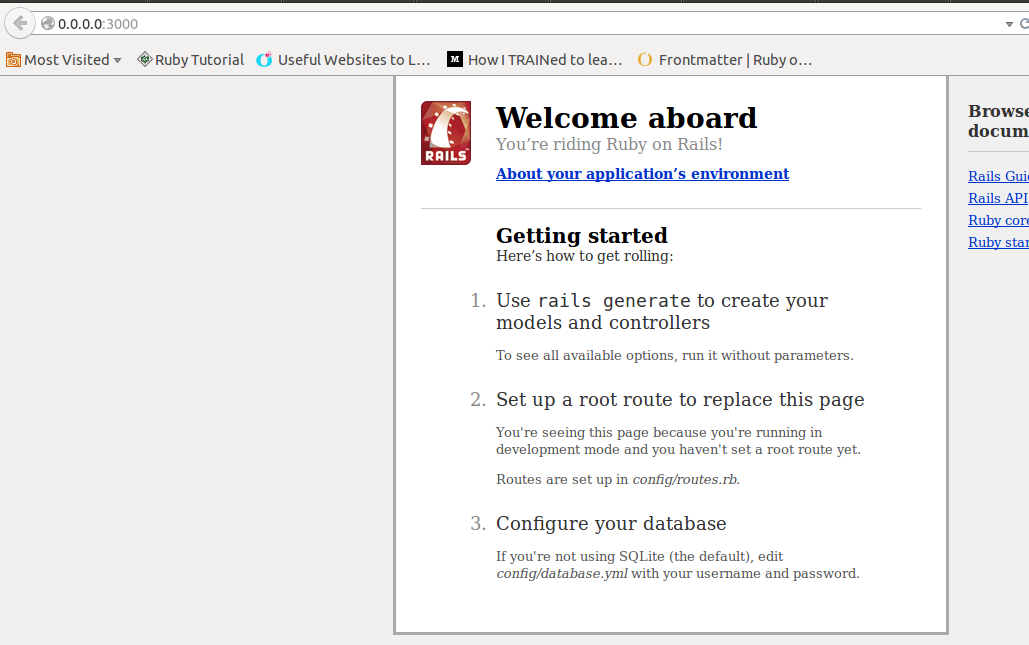Rails No Such File Or Directory Config Run

Rails server exiting immediately after. No such file or directory. In development on localhost:3000 =>Run `rails server -h` for more startup. HowTo configure Apache to run Redmine. Update the config/environment.rb file to force the rails environment to production. No such file or directory.
Troubleshooting Passenger + Apache and Ruby This page provides guidence on what to do when you encounter problems. Table of contents • Loading. First things to try 1 Check the Passenger log file One of the first things you should do upon encountering a problem, is to check. The log file is where Passenger prints to when it encounters a problem or when it wants to tell you something.
This log file contains: • Passenger info, warning and error messages. • Everything that the application writes to STDOUT and STDERR.
This typically consists of errors that the application encounters during startup, but not errors that it encounters when it's handling requests. The Passenger log file is the global (not the per-vhost) Apache error log file.
This is typically located in /var/log/apache2/error_log. You can find out the exact location of the error log by running passenger-config --detect-apache2. Or, if you configured the directive, then the log file is in the referenced file. Not finding anything useful in the Passenger error log? Please read 2 Check the application log file The application or web framework may have its own log file that is independent from the Passenger log file. You should also check that file to see whether your application or web framework has logged any important messages.
For example, Ruby on Rails logs to log/development.log and log/production.log. When an error occurs during request handling, it is typically logged here. Note that this file does not contain errors that Rails encounters during startup – those kinds of errors are typically written to STDERR, which means they end up in the Passenger log instead. Note that Passenger runs applications in the 'production' environment by default (that is, Passenger sets RAILS_ENV, RACK_ENV, NODE_ENV and related environment variables 'production'). So if you're using Rails, please be sure to check production.log instead of development.log. 3 Upgrade Passenger to the latest version Some problems are caused by bugs in Passenger.
Passenger is under active maintenance and development, so there is a chance that – assuming you really ran into a bug – the bug is already fixed. Please and check whether the problem is still there.
If you suspect that your problem is a bug in Passenger, and upgrading didn't fix it, please. If upgrading Passenger didn't help, and you don't think your problem is caused by a bug, then please continue with this troubleshooting guide. 4 Consult the in-depth topics Passenger takes care of a lot of things for you under the hood. If you don't know what Passenger does, then problems may seem opaque. Try; it may help you with understanding the problem and with troubleshooting. 5 Out of ideas? Try the support resources If you are stuck with a problem, please do not hesitate to contact one of the support resources.
Passenger has a friendly community of users who look out for each other. We – Passenger's authors – are also ready to help you whenever we can. Post a question on Stack Overflow if you are experiencing problems. Support on Stack Overflow is provided by the community, and our own developers also watch Stack Overflow on a regular basis.
Bs 3643 Iso Metric Screw Threads. But support here is provided on a best-effort basis, so sometimes a bit of patience will help. Be sure to use the 'passenger' tag. If you are experiencing a problem that you believe is a bug, please report it here. Please report security vulnerabilities to. We will do our best to respond to you as quickly as we can, so please do not disclose the vulnerability until then. If you are a customer, then you are eligible for basic priority support. Please submit your support ticket via.
For most customers, this basic priority support has a response time of 3 working days, with a maximum of 1 support incident per month. Please consult your contract for the exact support level that you are eligible for. We also provide premium support contracts for those who desire higher support levels, for example 24x7 phone support with a response time of 1 hour. Common problems Why does the first request take a long time? Symptoms The first request to your application takes more time than usual. Subsequent requests have the normal speed.